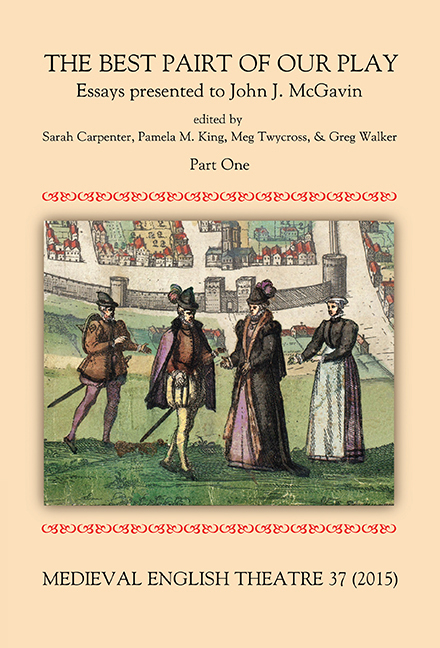Book contents
- Frontmatter
- Contents
- Epigraph
- Editorial
- In honorem John J. McGavin
- John J. McGavin: Bibliography
- The Places of Foolery: Robert Armin and fooling in Edinburgh
- George Bannatyne's ‘Sertane Mirry Interludis’, and Sir David Lyndsay's play
- The Linlithgow Interlude of 1540 and Lyndsay's Satire of the Thrie Estaitis
- Stage Directions in Lyndsay's Ane Satire of the Thrie Estaits
- The Dramatic Voice of William Dunbar
- How to Track a Bear in Southwark: a learning module
- The Digby Mary Magdalen in Performance: a merry peripeteia
- ‘Thus am I Rent on Rode’: taking apart the Towneley Crucifixion
- The Second Shepherds' Play: a play for the Christmas season
- ‘They did not come out of an Abbey in Lancashire’: Francis Douce and the manuscript of the Towneley Plays
- EDITORIAL BOARD (2015)
The Places of Foolery: Robert Armin and fooling in Edinburgh
Published online by Cambridge University Press: 05 March 2016
- Frontmatter
- Contents
- Epigraph
- Editorial
- In honorem John J. McGavin
- John J. McGavin: Bibliography
- The Places of Foolery: Robert Armin and fooling in Edinburgh
- George Bannatyne's ‘Sertane Mirry Interludis’, and Sir David Lyndsay's play
- The Linlithgow Interlude of 1540 and Lyndsay's Satire of the Thrie Estaitis
- Stage Directions in Lyndsay's Ane Satire of the Thrie Estaits
- The Dramatic Voice of William Dunbar
- How to Track a Bear in Southwark: a learning module
- The Digby Mary Magdalen in Performance: a merry peripeteia
- ‘Thus am I Rent on Rode’: taking apart the Towneley Crucifixion
- The Second Shepherds' Play: a play for the Christmas season
- ‘They did not come out of an Abbey in Lancashire’: Francis Douce and the manuscript of the Towneley Plays
- EDITORIAL BOARD (2015)
Summary
‘Foolery, sir, does walk about the orb like the sun, it shines everywhere.’ So says Feste, voiced, as we believe, by Robert Armin in the first performances of Twelfth Night. The words are Shakespeare's, but Armin in his own writing seems to confirm both the geographical spread and the peripatetic nature of fooling. In the most immediately engaging and lively of his works, Foole upon Foole, first published in 1600, he offers conversational anecdotes of six household fools. These are ‘naturals’, individuals with mental impairments rather than the witty ‘artificial’ fools of contemporary drama, and Armin is at pains to assert their historical actuality: he reports names of real and recognisable patrons, known places, often claiming or re-constructing eyewitness accounts. While it is impossible to verify all his facts, which are plainly polished in the interests of comic entertainment, this assertion of actuality is an important factor in the purpose and effect of his narratives. But whether genuine reporting, traditional anecdote or rhetorical exercise, Foole upon Foole is one of the very few works that gives us some insight into the kinds of laughter provoked by the natural fool, and thus into a form of entertainment and a habit of mind that we now tend to find uncomfortable and alien.
One interesting feature of Armin's narration is a sense that the force of this kind of foolery often rested significantly in physical space. The interaction of the body of the natural fool with his environment, and the spectator's vivid awareness of the concrete and social spaces of that environment, are important elements in the meaning and impact of fool-generated laughter. The six fools Armin describes are all located in particular places: the City of London, Greenwich, Haughton in Nottinghamshire, Mansfield, Esam in Worcestershire. The furthest flung from London is the Scots fool Jemy Camber, whose antics are played through Edinburgh. Armin's stories of Jemy Camber are rooted in local and geographical detail, details which both give the fooling its power and also suggest fascinating glimpses of actuality. While we can never fully untangle fact from fiction, or information from rhetorical persuasion, the tales thus appear to offer us a range of insights — both historical and theoretical — into the life and times of a Scots royal fool, into Armin himself, and also more broadly into the role of space and place in sixteenth-century foolery.
- Type
- Chapter
- Information
- Medieval English Theatre 37The Best Pairt of our Play. Essays presented to John J. McGavin. Part I, pp. 11 - 26Publisher: Boydell & BrewerPrint publication year: 2015



